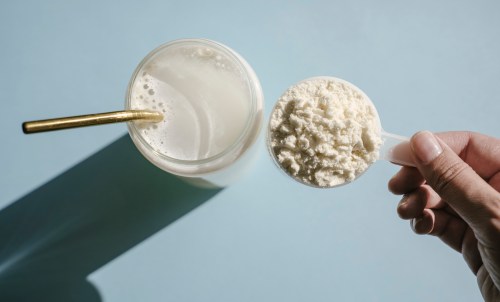Similar to fingerprints, no two microbiomes are the same—the makeup of your gut is completely unique to you. That said, while research is only beginning to understand the complexities of the microbiome, scientists have found some commonalities when it comes to the makeup of a well-balanced microbiome.
Experts in This Article
microbiome researcher
We recently caught up with Mahmoud Ghannoum, PhD, a microbiome researcher and co-founder of BIOHM, who shared a few general tips to help repair your gut if you’ve been feeling like it’s a little out of whack. Just keep in mind: Gut health is highly nuanced, and folks should approach the topic based on what’s best suited to their individual needs. (No single tip will serve as a cure-all, you know?) That said, Dr. Ghannoum breaks down five important ways to start giving your gut more of the nutrients it needs—and it might be easier to get on the right tract track than you might expect.
5 tips for healing your gut, according to a microbiome researcher
1. Modify your dietary habits depending on your specific needs
First things first, Dr. Ghannoum says what you eat (and how you eat it) plays a significant role in the health of your gut, especially if you’re one of the five to 10 percent of the worldwide population that sufferers from irritable bowel syndrome (IBS).
“Some people with IBS find that a low FODMAP diet—which restricts certain types of carbohydrates that can ferment in the gut—is helpful in reducing IBS symptoms,” Dr. Ghannoum says. According to Cleveland Clinic, this includes certain foods like legumes and wheat. That said, this certainly doesn’t affect the majority of the population, which is why Dr. Ghannoum stresses the importance of working with a registered dietitian or healthcare provider to develop a personalized plan to avoid any nutrient deficiencies down the road.
What’s more, Dr. Ghannoum explains that it’s important to adapt your eating habits in addition to changing what you eat. “For managing IBS symptoms, I also recommend the following dietary changes: avoiding large meals, chewing food thoroughly, adequate hydration, and eating slowly,” he says. Out of these, Dr. Ghannoum says adequate hydration is imperative for maintaining regular bowel movements and preventing constipation.
2. Reduce stress whenever possible
Though it’s hard to imagine how your mind can play a role in your gut, research has shown that the two are inextricably linked to one another. Namely, stress can wreak havoc on your gut health. That said, Dr. Ghannoum offers a few simple tips for reducing stress that can positively affect your microbiome. “Some examples of stress-reducing activities include deep breathing exercises, meditation, progressive muscle relaxation, guided imagery, and yoga,” he says.
Additionally, Dr. Ghannoum says it’s important to take a step back and work to identify and address the sources of stress in your life, whether they are related to work, relationships, or other factors. However, he notes that there are many ways to reduce stress, and what works for one may not work for another. Instead, it requires a bit of trial and error to figure out what works best for you.
3. Engage in exercise regularly, but don’t overdo it
It’s no secret that exercise can positively affect much more than just your gut health. Indeed, even one minute of exercise daily can help boost your longevity by up to 40 percent. That said, Dr. Ghannoum notes it’s important to avoid overdoing it either, which can have an adverse effect on your gut health. “Exercise can be helpful for managing IBS symptoms but can also trigger symptoms if not done properly. It’s important to start slowly and gradually increase the intensity to avoid any triggers,” he says.
“Exercise can be helpful for managing IBS symptoms but can also trigger symptoms if not done properly. It’s important to start slowly and gradually increase the intensity to avoid any triggers.”—Mahmoud Ghannoum, PhD
As such, Dr. Ghannoum recommends low-impact activities like walking, swimming, or yoga as a good place to start. He also notes that prepping the body for a workout is critical for your gut health. “It’s important to stay hydrated and avoid exercising on a full stomach. Also, incorporating relaxation techniques like deep breathing exercises, progressive muscle relaxation, or mindfulness meditation before or after exercise can help reduce stress and promote relaxation,” he says.
4. Sleep, sleep, and sleep some more
Aside from being in a grouchy mood all day, Dr. Ghannoum notes that poor sleep can also equate to poor gut health. “Poor sleep hygiene can exacerbate stress, anxiety, and other symptoms associated with IBS,” he says. On the other hand, he notes that good sleep hygiene means sticking to a sleep schedule, creating a relaxing bedtime routine in a sleep-conducive environment, and avoiding stimulating substances like nicotine and caffeine.
The microbiome researcher also says to avoid a long midday nap whenever possible. “It’s also important to limit naps to 30 minutes or less and avoid napping in the late afternoon or evening, as this can interfere with nighttime sleep,” Dr. Ghannoum says.
5. Give the gut natural probiotics to nosh on
Whether you’re just starting your gut health journey or have been practicing gut-boosting techniques for years, you’ve likely heard talk about probiotics. That’s because probiotics are live bacteria highly beneficial to gut health. “Some research suggests that taking probiotic supplements or eating probiotic-rich foods—like yogurt, kefir, fermented food—can be helpful for managing IBS symptoms,” Dr. Ghannoum says. However, before consuming any type of supplement, he recommends consulting with a healthcare professional to assess your needs. What’s more, Dr. Ghannoum notes that more research is needed to determine the best probiotic strains and dosages for the most effective gut health benefits.
A dietitian explains a low FODMAP diet:
Sign Up for Our Daily Newsletter
Get all the latest in wellness, trends, food, fitness, beauty, and more delivered right to your inbox.
Got it, you've been added to our email list.











